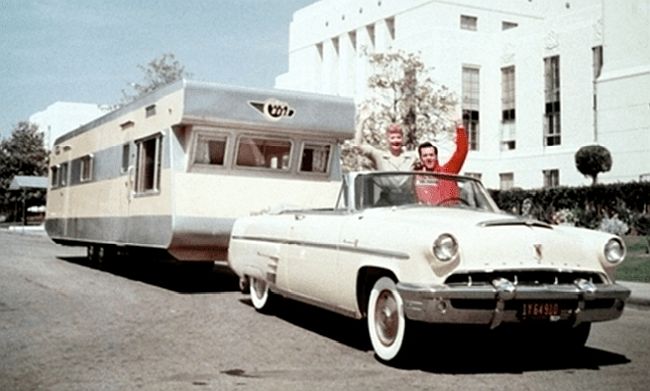Can I tow this Camping Trailer? How to Determine if a Trailer is within Tow Vehicle Ratings
Why does the weight of a camping trailer matter?

A good RV dealer will always ask you about your tow vehicle before showing you a camping trailer. That’s because he needs to know how much your vehicle can tow. It’s important that your fully-loaded vehicle and trailer don’t exceed the Gross Combination Weight Rating (GCWR) specified by the manufacturer of your tow vehicle (the TV) and the camping trailer.
An overloaded towing vehicle might be able to pull a particular camping trailer, but can it stop it? For instance, overloaded brakes may not work properly; overloaded tires are more susceptible to blowouts and may have limited traction on the front tires.
Overloading your tow vehicle can cause your engine and/or transmission to overheat and put a severe strain on your suspension. If you get into an accident with an overloaded tow vehicle/camping trailer, your insurance company may deny the claim.
How can you determine what tow vehicle and camping trailer will work for you?
Start with your potential tow vehicle. On the door frame, you will usually find the numbers that you need: the GVWR (the Gross Vehicle Weight Rating), the GCWR and the Dry Weight of the towing vehicle. Subtract the Dry Weight from the GCWR and that will give you the number you can safely tow.
However, that number does not include cargo. Subtract the amount of weight that you will be carrying inside the vehicle – the people, their pets and everything they packed.
Now subtract your Gross Vehicle Weight (GVWR.) This is how much the trailer actually weighs when the tanks are full and all your stuff is loaded, plus the tongue weight. If you haven’t purchased the trailer yet, you can guestimate this number. As a general rule, you can expect a loaded trailer to weigh about 250 pounds per foot of trailer, excluding the length of the hitch.
If you know the unloaded Dry Weight of the trailer, you can estimate weight from that but be sure to include all the manufacturers’ options. Include any upgrades you made, as well as the food, water, clothing, equipment, and other cargo you will be carrying. It’s going to be heavier than you think.
If the weight of your fully-loaded tow vehicle and the fully loaded trailer does not exceed 80% of the GCWR, you are good to go.
Go check your hitch weight that is. Hitch weight, also known as tongue weight, is the amount of downward pressure a fully loaded trailer places on the hitch ball. This number should be about 10% of the weight of the loaded trailer.
Armed with this number, you can buy the correct hitch. I recommend that you buy a hitch that is too large just in case you accidentally overload the trailer. A weight distributing hitch (which distributes the load across all axles) with sway control or an independent sway control bar is your best choice. Your RV dealer can advise you which option is the best.
The video above shows what happens when you have an improper hitch weight. Should this ever happen to you, slow down without using the brake pedal and keep your steering wheel straight. When you are under control again, stop and redistribute your load.
Here are two calculators that may help you:
http://changingears.com/rv-sec-calc-trailer-weight-tt.shtml
https://rv.campingworld.com/towguide
